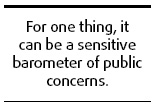Editorials
An independent source
(China Daily)
Updated: 2009-12-22 07:50
 |
Large Medium Small |
The Chinese Academy of Social Sciences "Blue Book 2010" just reiterated a widely accepted fact - the World Wide Web has become an independent source of news and information in this country.
Owing largely to its democratic, if not anarchic, nature, the Internet has not been subordinate to any specific regime since its inception. We have seen consistent endeavors to influence it, but to date those efforts have turned out to be unsuccessful.
| ||||
With the traditional media absent or hesitating, the Internet penetrated deep into the territory of controversy, says the "blue book", becoming a platform for netizens to share information and rally public opinion.

For those having difficulty adapting to the new reality of greater transparency of the Internet era, this is no doubt something to abhor. We have witnessed some "unfortunate" local officials lambasted for arrogant words, some even ended up being sacked for what they said. The most "unlucky" of them all might be one in Nanjing, whose unpopular comments on real estate prices drew netizen curiosity about the watch he wore and the cigarettes he smoked, followed by an official investigation that found him guilty of corruption and finally landed him in jail.
Given the Internet's influential role in various incidents of public concern, authorities have demonstrated impressive emphasis upon paying attention to public opinion expressed on the Internet. Local authorities are becoming more responsive to the Web. And we are sure such responsiveness will ultimately translate into responsiveness to public concerns in the real world, even though the process may take much longer.
The rise, or popularization to be exact, of the Internet as a new and increasingly mainstream means of communication, while posing challenges to those accustomed to traditional concepts of governance, at the same time presents invaluable opportunities for those truly into constructive interactions with the masses. For one thing, it can be a sensitive barometer of public concerns.
For that alone, the authorities should embrace the Web and take advantage of its democratic nature to promote popular participation.
(China Daily 12/22/2009 page8)













